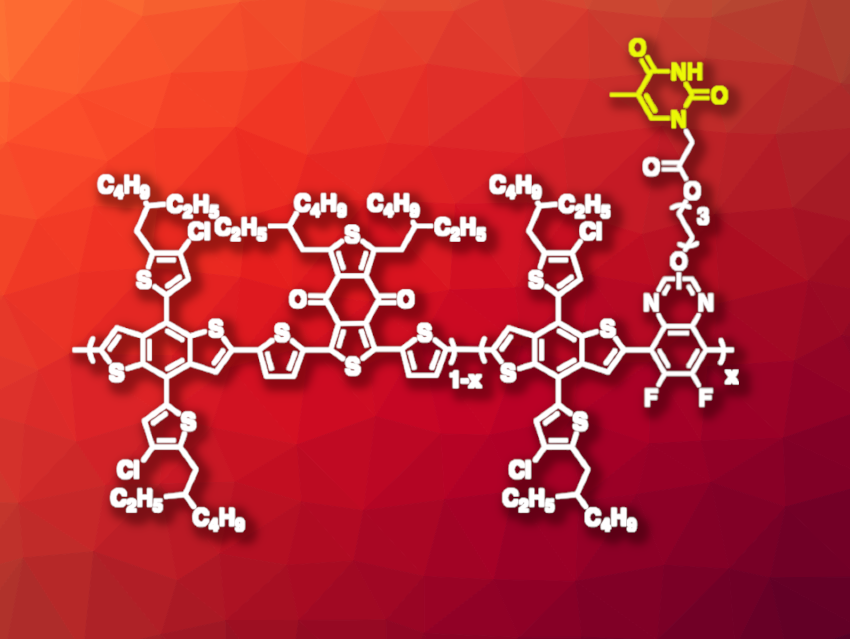Polymer solar cells (PSCs) can be built using polymer donors and small-molecule acceptors. Polymer materials can be useful, e.g., to achieve flexibility and stretchability in solar cells. However, stretchable systems that combine mechanical robustness and high efficiency can be difficult to create using existing, rigid polymers. One strategy to improve stretchability can be the introduction of dynamic bonding, such as hydrogen bonding. Thymine groups, for example, can be used in polymers to provide sites for hydrogen bonding.
Bumjoon J. Kim, Korea Advanced Institute of Science and Technology (KAIST), Daejeon, Republic of Korea, Barry C. Thompson, University of Southern California, Los Angeles, USA, and colleagues have developed a thymine-functionalized terpolymer (general structure pictured, thymine unit in yellow) that can be used as a polymer donor in stretchable polymer solar cells with high performance. The team used a 6,7-difluoro-quinoxaline (Q-Thy) monomer with a thymine on the side chain together with the polymer PBDB-T-2Cl, also known as PM7, to synthesize three polymer donors. The three terpolymers are called PM7-Thy5, PM7-Thy10, and PM7-Thy20 (with 5, 10, or 20 mol% of the Q-Thy monomer, respectively).
The team found that the polymer donor PM7-Thy10, when blended with the small-molecule acceptor L8-BO, achieves a higher power conversion efficiency (PCE) than PM7, while also showing improved stretchability (i.e., a significantly higher crack onset strain) and mechanical durability. A stretchable solar cell based on PM7-Thy10 showed a PCE of 13.7 %, while a PM7-based stretchable solar cell showed a PCE of 11.3 %. According to the researchers, the developed polymer donors exhibit stronger aggregation and enhanced crystalline properties due to intermolecular hydrogen bonding involving the thymine groups. The work could be useful for the design of wearable electronics.
- High-Performance Intrinsically Stretchable Polymer Solar Cell with Record Efficiency and Stretchability Enabled by Thymine-Functionalized Terpolymer,
Qingpei Wan, Soodeok Seo, Sun-Woo Lee, Jinho Lee, Hyesu Jeon, Taek-Soo Kim, Bumjoon J. Kim, Barry C. Thompson,
J. Am. Chem. Soc. 2023.
https://doi.org/10.1021/jacs.3c02764




